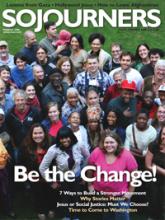The Jesus movement included everyone from tax collectors to sex workers; it truly was a movement of diversity. In today’s world, I am encouraged to see a movement of Christians who want to “preach good news to the poor.” But all too often, well-meaning progressive Christians from privileged backgrounds attempt to speak for or bring God to the poor. This is a mistake: The poor can speak for themselves, and God is already present in their communities.
As someone who experienced poverty while growing up in an inner-city community in Brooklyn, I know there is a great deal of strength among the poor; it takes enormous tenacity and resourcefulness to survive in an underserved community. I have experienced well-meaning Christians from more privileged backgrounds who feel called to serve poor people, but instead end up negating their autonomy and enacting charity, as opposed to justice.
I have also been blessed over the past few years to be part of organizations that follow a justice model for ending poverty—groups such as Union Theological Seminary’s Poverty Initiative, which is dedicated to “building a movement, led by the poor, to end poverty.” It includes both poor people and those who are not from poor backgrounds at every level of leadership, from speaking and writing to on-the-ground organizing. Based on my experience, here are some practical ways to build a multiracial, multiclass, progressive Christian movement.
Read the Full Article

